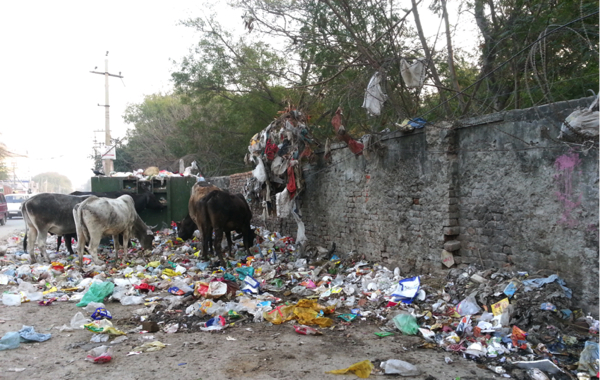You have no items in your cart. Want to get some nice things?
Go shopping
It’s impossible to travel an appreciable distance in Delhi without stumbling upon a cow. Sometimes, traffic is deviated to avoid disturbing a cow stretched languidly in the middle of a busy intersection. In some areas, cows strut around with colourful threads tied to their horns or religious marks drawn onto their hides by superstitious devotees. Street vendors feed them leftover food and pat their noses amicably. Delhi’s cows are big, but thin. In that respect, they mirror the emaciated actors on massive billboards that dot the city.
Millions of people in India refuse to eat beef. Religious leaders encourage their devotees to feed and pray to certain cows on certain days in order to encourage the gods to fulfil their wishes. The number of wishes that have been granted has, surprisingly, never been measured. Many people who refrain from eating beef claim that Hindu scriptures ban its consumption because a cow is ‘holy’. But in fact, contrary to popular belief, the scriptures do not claim that killing a cow will reincarnate somebody as a cockroach, an ant, or Osama bin Laden. No religious text orders its readers to refrain from eating beef.
I have three cow bones in my bedroom: they are the main attraction of my house in New Delhi. I salvaged them from a field in a village outside Bandhavgarh. A resident of the area informed us that tigers often left the forest that bordered the field and killed and ate grazing cows. Then, they licked the bones clean. The cows there were tiny and skinny and they didn’t produce much milk, but they were faithfully taken to greener pastures every dawn.
A few days later, I showed some friends from my biology class my bones. They exclaimed at the coolness and beauty of the bones in a manner exclusive to students of biology. Then, one of them asked me which animal they belonged to. At my reply, I heard a shriek and the bones were thrust back into my hands before I could react.
“Oh my God! I can’t touch cow bones! I’m Hindu! Ewwww!”
Incapable of responding to that exclamation, I sat down at the dining table and ate my food silently. Then, we cleaned up the blood leftover from the three animal dissections that we had carried out earlier that day.
 I like cows. They’re friendly, absurd, at times a little dumb, and provide excitement on the otherwise boring streets. They’re interesting animals. However, is the cow important enough for thousands of people to pray to it even when it’s incapable of milk production? Should we have special laws for cows and not for other, endangered, animals?
I like cows. They’re friendly, absurd, at times a little dumb, and provide excitement on the otherwise boring streets. They’re interesting animals. However, is the cow important enough for thousands of people to pray to it even when it’s incapable of milk production? Should we have special laws for cows and not for other, endangered, animals?
In fact, is banning the consumption of certain animals justified in any religion?
Many religious traditions have their roots in social, not spiritual practices. Moreover, most of them are not even applicable to us today- they passed their expiry dates centuries ago. But the unfortunate part of our society is that people are easily offended by criticism directed at their religion. They refuse to accept the redundancy of these practices.
Rowan Atkinson wrote, “To criticize people for their race is manifestly irrational but to criticize their religion- that is a right. That is a freedom.”
In The Myth of the Holy Cow, historian D.N. Jha makes a strong case for our ancestors’ affinity for beef. He argues that the cow taboo arose not because cows were holy but because they were, quite simply, too valuable to butcher. They were probably the most important animals used in agriculture. Killing them would have threatened food security. So, the best way to get people to stop killing cows was by making the action religiously taboo. It worked, and its effects have reverberated down generations. Obviously, Mr. Jha required police protection for a few months after the release of his book.
I asked my great-aunt, who had just returned from a visit to a small, religious town, if she had ever fed a cow. She replied in the affirmative. She had gone to lunch at somebody’s house but didn’t like the food that was served. Since she didn’t want to waste the food, she took it onto the street and looked for an animal to feed it to. The road was saturated with scooters, auto rickshaws, and cows. There were cows everywhere one looked. So, she ran toward one to feed it her lunch. The cow ran away. My sixty year old great-aunt proceeded to chase the cow through the streets of Ujjain until it accepted her food. The obstinate cow demanded the food in a bowl- it refused to eat off the road. Apparently, it enjoyed its lunch more than my aunt did.
Another aunt told me that when her father died, a priest ordered her to feed a cow every morning for a week if she wanted his soul to rest in peace. Nobody in the house was allowed to eat before a cow accepted a chappati from her. Unfortunately, she couldn’t find a cow grazing in her upscale neighbourhood. Undeterred, she drove to an overcrowded neighbourhood a few kilometres away to feed a different cow every morning. The moment the cow accepted its breakfast, the entire household was allowed to commence theirs.
A religious man I spoke to told me he prayed to the gods, and, by extension, the animals that are associated with them. He found the veneration of certain animals ridiculous. For example, by praying to Lord Ganesha, one indirectly prays to a mouse. Similarly, one prays to a tiger along with Goddess Durga and a cow with Kamadhenu. That doesn’t make the cow special!
When I asked a man from rural India who has been working in Delhi for the last few decades if he had ever tried beef, he grunted . Then he gave my grandmother a scandalised look and proceeded to glare at me.
To get a different perspective on the matter, I called up a pandit named Aacharya Brahm Dev Vedalankar. I told him that somebody had advised me to feed a cow in order to pass my exams the following month. He asked me where I lived, and named a gowshala (cow shelter) close to my house.
He told me that cow worship held no meaning for him and his group. However, I could feed the cows some green grass if that was what I believed in. Pleasantly surprised at his lack of enthusiasm at cow veneration, I asked him why I had to feed a cow. Couldn’t I feed a stray dog instead?
Aacharyaji explained that, according to traditional beliefs, man has the responsibility to respect all living creatures. If I want to feed the dogs, I should give them chapattis since they enjoy eating those more than the [bland] grass that the cows eat.
Every morning, he leaves out some food for ants, cows, dogs, birds… the list is as extensive. He attributed no special privileges to the cow. He advocated compassion for all living creatures. The cow is as important as the roasted chicken on your dinner table. His clarity was a zephyr amidst the stifling obstinacy of most religious leaders around the world.

The standard response I get from people when I ask them why they believe that worshipping a cow will absolve them of their sins is, ‘It doesn’t harm anyone, so why shouldn’t I do it?’
Well, I don’t know. Shouting slogans at India Gate gets the government pretty worked up even though it doesn’t harm anyone. When the neighbours complain about me and my brothers climbing onto their roofs, they don’t appreciate the justification, ‘It doesn’t harm anyone’.
However, putting a taboo on something does harm somebody. In fact, it affects everybody. Prohibition makes questioning the very basis of various practices extremely hard. When somebody points out a flaw in a popular religion, hordes of extremists who claim to be ‘protectors of their faith’ swarm onto the streets and cry themselves hoarse about their hurt feelings.
But the presence of cows on the streets does have some positive ecological repercussions in parts of urban India. The food that they get from worshipers is just a treat. The cows actually get most of their meals from overflowing dustbins. Cows are essential to Indian cities not because they are holy, but because we need any help that we can get to ‘Keep Delhi Clean & Green’.






Very well written
Nice! But now Sushmaji will be very very angry. You may want to read The God Delusion (Dawkins).
Very Interesting. Amazing! An eye opener
It’s always a pleasure reading your articles